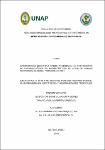Intervención educativa sobre adherencia al tratamiento no farmacológico en pacientes con el virus de inmuno deficiencia humana, Yurimaguas 2021

Date
2023Author
Villacorta Gómez, Jessica Katerine
Murrieta Sandoval, Tania Clavel
Metadata
Show full item recordAbstract
The research has the general objective of determining the effect of the educational intervention program on adherence to non-pharmacological treatment in patients infected with the Human Immunodeficiency Virus treated at the Hospital Santa Gema de Yurimaguas 2021. Methodology: the type of research was experimental, the design was quasi-experimental for a single group with two measurements (pretest and posttest); The study population was 20 patients, the instrument was a Checklist on adherence to non-pharmacological treatment in patients with HIV/AIDS, with validity of 0.82 and reliability of 0.729. Results: before the educational intervention, 100% were non-adherent and after the intervention, 100% were adherent. Before the educational intervention: knowledge was inadequate in 100% about physical activity, 75% about nutritious eating, 95% about managing emotional states, 100% about the consumption of alcohol, tobacco and psychotoxic substances, 85% about HIV prevention and other STIs; After the educational intervention: knowledge was adequate in 95% about physical activity, 90% about nutritious eating, 100% about managing emotional states, 60% about alcohol, tobacco, and psychotoxic substance use, and 100% about HIV prevention, and other STIs; the effect of the educational intervention program on non-pharmacological treatment in patients with the Human Immunodeficiency Virus, Hospital Santa Gema de Yurimaguas 2021, was positive (p-value=0.000; <0.05), accepting the proposed hypothesis. The study concludes that the educational intervention favors adherence to non-pharmacological treatment in the patient. La investigación tuvo el objetivo de determinar el efecto del programa de intervención educativa sobre la adherencia al tratamiento no farmacológico en los pacientes infectados con el Virus de la Inmunodeficiencia Humana atendidos en el Hospital Santa Gema de Yurimaguas 2021. Metodología: el tipo de investigación fue experimental, el diseño cuasi-experimental de un solo grupo con dos mediciones (pretest y postest); la población de estudio fueron 20 pacientes, el instrumento una Ficha de cotejo sobre adherencia al tratamiento no farmacológico en pacientes con VIH/Sida, con validez de 0,82 y confiabilidad de 0,729. Resultados: antes de la intervención educativa, 100% fueron no adherentes y después de la intervención el 100% fue adherente. Antes de la intervención educativa: el conocimiento era inadecuado en el 100% sobre actividad física, 75% sobre alimentación nutritiva, 95% sobre manejo de estados emocionales, 100% sobre consumo de alcohol, tabaco y sustancias psicotóxicas, 85% sobre prevención del VIH y otras ITS; después de la intervención educativa: el conocimiento fue adecuado en el 95% sobre actividad física, 90% en alimentación nutritiva, 100% en manejo de estados emocionales, 60% en consumo de alcohol, tabaco y sustancias psicotóxicas y 100% en prevención del VIH y otras ITS; el efecto del programa de intervención educativa en el tratamiento no farmacológico en pacientes con el Virus de la Inmunodeficiencia Humana, Hospital Santa Gema de Yurimaguas 2021, fue positivo (p-valor=0,000; <0,05), aceptándose la hipótesis planteada. El estudio concluye que, la intervención educativa favorece la adherencia al tratamiento no farmacológico en el paciente.
Collections
- Tesis [8]

